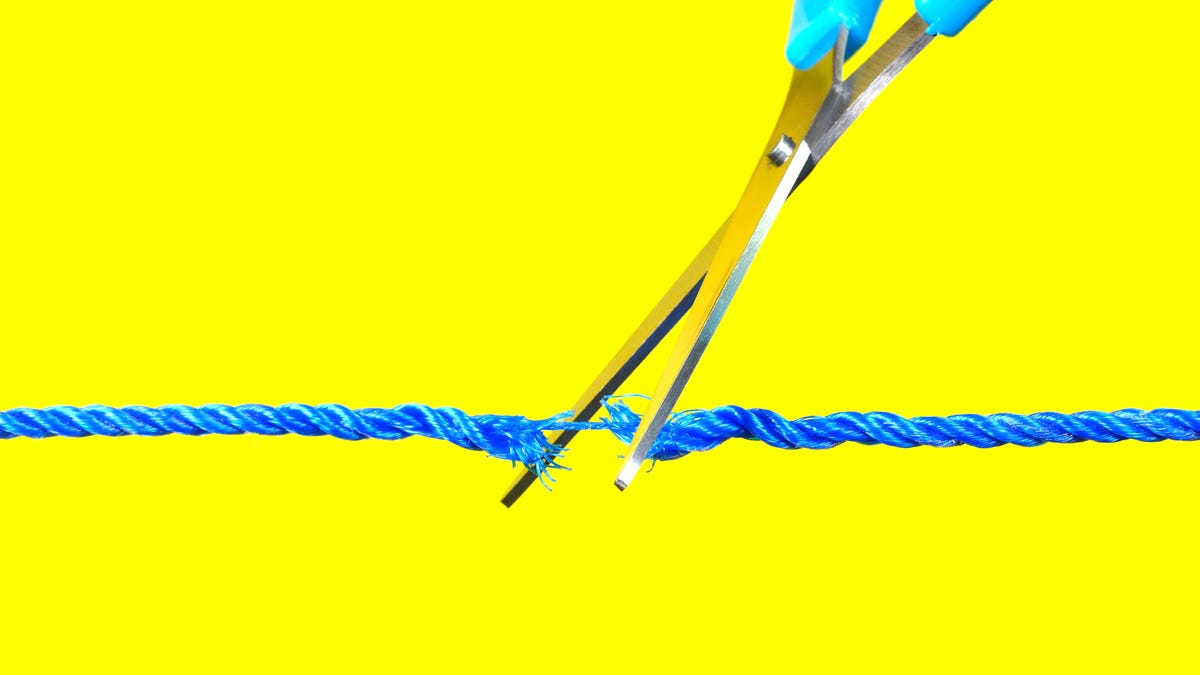Raise your hand if you’ve ended a relationship, sworn it was for good this time, and then found yourself backsliding like a runner on third headed for home. If this sounds all too familiar, don’t be embarrassed—the urge to reach back out to someone you once loved is real, and meeting up with an ex or texting after a few drinks is far from abnormal. But that doesn’t mean it’s healthy.
Here’s why it’s a bad idea: Running back to a relationship that wasn’t serving you—even if just for the night—is an inefficient way to get over it, says Susan Trotter, PhD, a relationship coach based in the greater Boston area. And after all, isn’t the purpose of a breakup to move on? While every dynamic (and demise of a dynamic) is different, there’s one tactic guaranteed to help you close that impossible-to-close chapter. And that’s implementing a no-contact rule.
“It may seem like an extreme move right after a breakup, but cutting off contact with an ex can be the fastest, most effective way to truly move on,” says Heather Hagen, LMFT, a licensed family and marriage therapist and the executive director of clinical outpatient services at Newport Healthcare.
Meet the Experts:
Susan Trotter, PhD is a relationship coach based in the greater Boston area.
Heather Hagen, LMFT, is a licensed marriage and family therapist and the executive director of clinical outpatient services at Newport Healthcare.
It’s normal to love those “I miss you” texts or the pangs of validation you feel every time your old situationship watches your Instagram Story. You shouldn’t, however, sacrifice your mental health or personal growth for an ounce of attention that might be more about your ex's ego than your connection, Trotter points out.
Ahead, relationship experts explain why the no-contact rule is a fool-proof way to move onwards and upwards post-breakup.
What is the no-contact rule?
A no-contact rule is pretty much exactly what it sounds like. “[It] typically means cutting off all contact with someone after a romantic relationship ends,” says Trotter. “When you establish a ‘no-contact’ rule, it means having no communication with your ex via phone, text, apps, or social media. This means zero contact, even if they reach out to you or if you feel pulled to contact them.”
After a relationship ends, it’s important to cement these boundaries—even if just for a crucial and temporary healing period because “having even occasional contact will prolong the grief and make it more difficult to move on,” Trotter explains. “It really does need to be absolute.”
It’s important to note that no-contact includes social media, too. Sure, maybe you’re resisting the urge to slide into their DMs, but if you’re refreshing their profile page again and again, you aren’t really cutting them out. That’s why blocking an ex—no matter how amicable the breakup—is the best way to protect your peace, says Trotter. “Doing so will keep you from obsessively checking your ex’s social media to see what they’re doing, which also keeps you engaged in a way that will prolong the grief and keep you from moving forward more easily.”
When and how should I put the no-contact rule in place?
Communication is not only important in a relationship, but also important during a breakup. Once you’ve had the necessary conversation (or conversations) and decided to part ways, bring up the idea of cutting off contact with each other.
“Explain that while it may be difficult to have no contact, you feel that setting this boundary will be the best way for both of you to mourn the relationship and move on in a way that allows for new experiences and perhaps new relationships in the future,” Trotter says. “Ask them to respect your boundary, and let them know that if they do reach out, you will not respond—not because you don’t care, but because it is the best way for you both to get over each other.”
Hagen suggests telling your ex that you're not even making a selfish request, but rather, something mutually beneficial. “It’s important for the person to know that this will help both of you embrace self-empowerment and not feel tempted to see what the other person is up to,” she says. “And practicing self-care after a breakup is key to moving on confidently for yourself.”
How long should I practice the no-contact rule?
It's worth noting that instituting a no-contact rule with your ex doesn’t necessarily mean you’ll never speak again. In fact, in most cases, you might just need a few months to heal and grow and get over the relationship before an occasional “Hey, what’s up, how are you?” feels appropriate and safe for your mental health.
“The length of time is really an individual decision dependent on the circumstances of the breakup,” Hagen says. “If one person wants to sever ties forever—if they believe this will help protect their mental health, for example—then the other party should respect their wishes. If both parties agree to eventually be friends, that can work at some point, too.”
The no-contact rule is about allowing both yourself and your ex the space to grieve and move on—so, however long that takes is entirely dependent on the people involved and situation at play. When having the initial conversation, set a boundary for how long you might need to eliminate contact. This might look like requesting a permanent separation, or something more temporary. Your no-contact boundaries are also subject to change, and that’s okay, too.
How effective is the no-contact rule?
The TL;DR answer? Very effective. In fact, Hagen likens the no-contact rule to a detox—one that will actually help clear your mind post-breakup.
“Our brains often look for a dopamine ‘hit’ by searching for any news, pictures, or information about a recent ex,” she says. “They need to be trained to forgo the impulse, and it will get easier to deny in time.”
While there are situational and psychological differences for each person and each breakup, getting over heartache comes down to going through the grieving process, retraining your brain a bit (see: resisting that impulse to seek out new information!), and changing ingrained habits with time, Trotter says.
Another reason the no-contact rule helps: It’s easy to romanticize a relationship once it’s over, and cutting off communication with an ex will stop the fantasy. Pictures, Instagram stories, and even the occasional text from your ex will only amplify the phenomenon of romanticizing a relationship that wasn't working. “[The no-contact rule] allows for each individual to develop better boundaries, increase self-esteem, and reassess any dysfunctional relationship patterns,” Hagen says.
“The bottom line is that people who maintain a no-contact rule after a breakup tend to get over the relationship more quickly and more effectively,” Trotter adds. “That means they have taken time to sit with their emotions, to reflect on the relationship, to process the loss, and to learn from it in a way that allows them to move on in a positive way.”
What if I break the no-contact rule—or my ex does?
You’re a human being, which by definition means you’ll mess up—both in your relationships and your breakups. But just because you or your ex slips up and sends that patented “IMY” text doesn’t mean you should revert back to your old ways of communication. In fact, if anything, it should serve as a reminder that boundaries exist for a reason. It doesn’t discount your feelings or the fact that you absolutely can miss the person; it just means you need to prioritize your own progress instead.
“If you reach out to your ex at a time of vulnerability, don’t beat yourself up about it,” Trotter says. “You’re human, and it’s okay to make mistakes. Acknowledge it—to yourself and to your ex—and then reestablish the boundaries.”
To help you get through the difficult moments of no-contact, practice self-care, spend time with friends and family, take time to reflect by journaling, and even seek guidance from a coach or therapist, she suggests.
Now, if you’re worried about breaking the no-contact rule again (hey, it’s called self-awareness, and I applaud you!), put up safeguards while you’re still thinking clearly, says Hagen. “Have your friend hold your phone for the night, or delete the number of your ex so you’re not tempted to call or text them later.”
Breakups aren’t easy, nor are they black and white. But while you might feel this “need” to stay in contact after the split, you’re actually doing yourself a massive disservice by keeping in touch when the emotional wounds are still fresh. And if you still care about your ex—I’m gonna go out on a limb and guess that you do—here’s a reminder that you’re doing them a disservice, too. You’ll both get through this. Promise!
Megan Schaltegger is an NYC-based writer. She loves strong coffee, eating her way through the Manhattan food scene, and her dog, Murray. She promises not to talk about herself in third person IRL.












